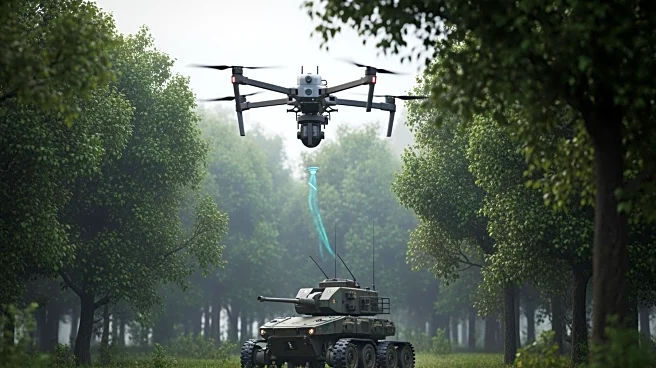What's Happening?
The British Army has disclosed the testing of two types of unmanned aircraft systems (UASs) and two types of unmanned ground vehicles (UGVs) during Exercise 'Forest Guardian'. This exercise involved soldiers from 11 Brigade and 3 Scots Battlegroup, alongside
Joint Expeditionary Force allies. The systems tested included two Anduril Ghost UASs, one Parrot Anafi USA UAS, one ARX Robotics Gereon UGV with a PodView autonomous sensor system, and one IDV Robotics Viking UGV. The exercise, part of the larger Exercise 'Tarassis', took place from early September to the end of October 2025 across the North Atlantic and Baltic regions. It marked a significant shift towards drone-centric warfare, showcasing the transformation of 11 Brigade into a specialized formation that utilizes unmanned systems as the primary maneuvering force.
Why It's Important?
The testing of unmanned systems during Exercise 'Forest Guardian' signifies a revolutionary shift in military strategy, emphasizing the use of technologically advanced forces to achieve tactical superiority. This approach allows smaller forces to exploit the near-surface battlespace effectively, potentially outmaneuvering larger conventional formations. The integration of UASs and UGVs into military operations could lead to enhanced operational efficiency and reduced risk to personnel. This development is crucial for the British Army as it adapts to modern warfare challenges, potentially influencing military strategies globally and impacting defense policies and procurement decisions.
What's Next?
The successful implementation of unmanned systems in Exercise 'Forest Guardian' may lead to further adoption and integration of these technologies in military operations. The British Army could continue to refine its strategies and tactics, focusing on drone-centric warfare. This may prompt other nations to evaluate and potentially adopt similar approaches, influencing global military dynamics. Future exercises may expand the use of unmanned systems, testing their capabilities in various environments and scenarios, and driving innovation in military technology.
Beyond the Headlines
The shift towards unmanned systems raises ethical and legal considerations regarding the use of autonomous technology in warfare. Questions about accountability, decision-making, and the potential for unintended consequences may arise as these systems become more prevalent. Additionally, the cultural impact on military personnel, who may need to adapt to new roles and responsibilities, could be significant. Long-term, this development may influence international arms control agreements and discussions on the regulation of autonomous weapons.















